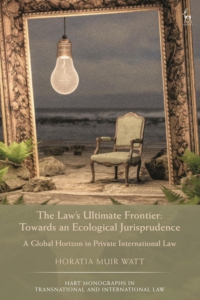Book review: H. Muir Watt’s The Law’s Ultimate Frontier: Towards an Ecological Jurisprudence – A Global Horizon in Private International Law (Hart)
(Written by E. Farnoux and S. Fulli-Lemaire, Professors at the University of Strasbourg)
 Horatia Muir Watt (Sciences Po) hardly needs an introduction to the readers of this blog. The book published last year and reviewed here constitutes the latest installment in her critical epistemological exploration of the field of private international law. More specifically, the book builds upon previously published fundamental reflections on the methods of private international law already initiated (or developed) in her previous general course (in French) at the Hague Academy of International Law (Discours sur les méthodes du droit international privé (des formes juridiques de l’inter-altérité)), as well as on the contemporary relevance of private international law (“Private International Law Beyond the Schism”). Numerous other works, naturally, also come to mind when reading this book (see among many others, ed. with L. Bíziková, A. Brandão de Oliveira, D. Fernandez Arroyo, Global Private International Law : adjudication without frontiers; Private International Law and Public law).
Horatia Muir Watt (Sciences Po) hardly needs an introduction to the readers of this blog. The book published last year and reviewed here constitutes the latest installment in her critical epistemological exploration of the field of private international law. More specifically, the book builds upon previously published fundamental reflections on the methods of private international law already initiated (or developed) in her previous general course (in French) at the Hague Academy of International Law (Discours sur les méthodes du droit international privé (des formes juridiques de l’inter-altérité)), as well as on the contemporary relevance of private international law (“Private International Law Beyond the Schism”). Numerous other works, naturally, also come to mind when reading this book (see among many others, ed. with L. Bíziková, A. Brandão de Oliveira, D. Fernandez Arroyo, Global Private International Law : adjudication without frontiers; Private International Law and Public law).
The publication of a book on the field that this blog deals with would be enough to justify it being flagged for the readers’ attention. We feel, however, that its relevance to our academic pursuits warrants more than a mere heads-up and, while it would be unreasonable (and risky) to try to summarize the content of this engrossing and complex book in a blog friendly format, we would like to make a few remarks intended to encourage the readers of this blog to engage with this innovative and surprising work.
